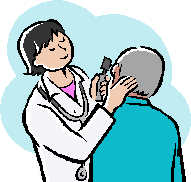Will anything help me to hear better? Will anything help me to manage better?
There are a number of different types of help available.
Some help is available from your GP and some help is available from the hospital (for example, the audiology clinic. The first place to go for help is usually your GP.

Depending on the source of the problem, the sorts of help you might get from your GP include:
- visual examination of your ear with an otoscope
- removal of wax
- antibiotics
- referral to a hospital (or audiology clinic)
Depending on the source of the problem, the sorts of help you might get from your hospital or audiology clinic include:
- visual examination of your ear with an otoscope
- removal of wax
- antibiotics
- surgery (e.g. removal of fluid in the middle ear)
- the fitting of a hearing aid
- advice on using the hearing aid
- In some areas hospitals or audiology clinics may provide:
– advice on conversation strategies (including tips on how to manage in different situations)
– advice on auditory training and lipreading practice
– advice on technical aids to hearing (Some hospitals also issue these, but it is rare)
Help is also available in the community. In addition to seeking medical help, you may also wish to seek help from the community; that is, from either social services and/or education.
The help available from education is usually to be found in colleges of further or adult education. The relevant classes have various names. They may be called “Lipreading classes” or “Understanding your deafness” or “Lipreading and communication skills” classes. The help provided may include:
- lipreading practice
- listening practice
- advice on conversation strategies (including tips on how to manage in different situations)
- advice on technical aids to hearing
The help available from social services may include:
- advice on technical aids to hearing (Some hospitals also issue these, but it is rare)
- occasionally social services also provide lipreading and listening practice and advice on conversation strategies
In some areas, you may find classes in libraries, day centres or homes for elderly people. Usually the classes are for adults (from 16 plus). A warm welcome should be provided for people of all ages and all walks of life.